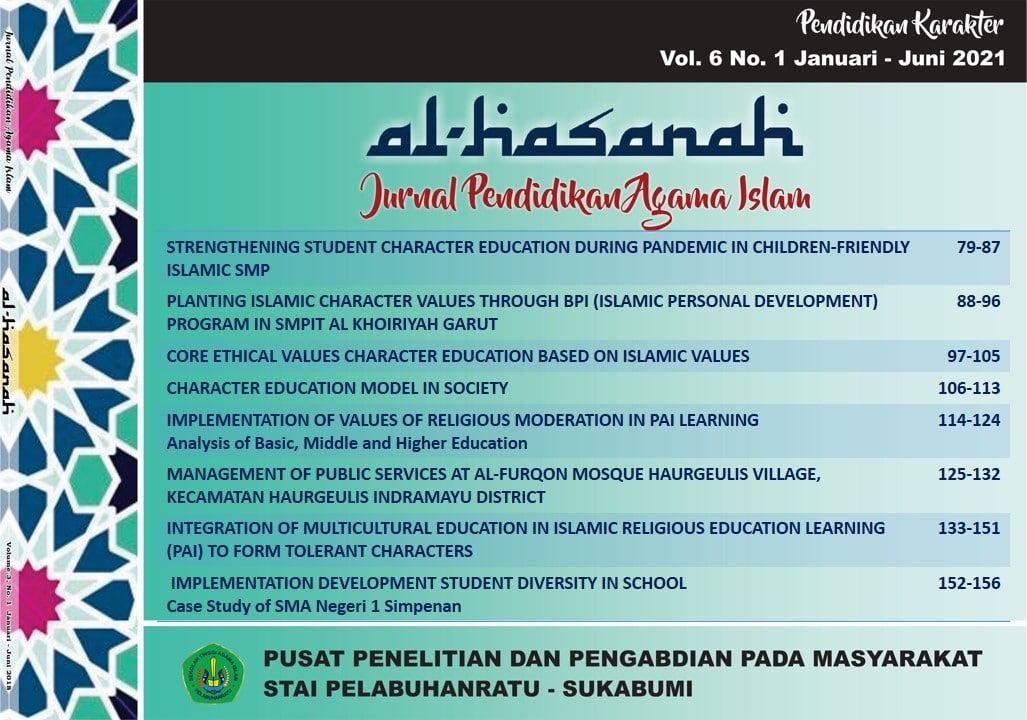PLANTING ISLAMIC CHARACTER VALUES THROUGH BPI (ISLAMIC PERSONAL DEVELOPMENT) PROGRAM IN SMPIT AL KHOIRIYAH GARUT
DOI:
https://doi.org/10.51729/6133Keywords:
Instilling Values, Islamic Character, IPD (Islamic Personal Development)Abstract
The purpose of this study in general is to analyze and find out the cultivation of Islamic character values through the BPI (Islamic personal development) program at SMPIT Al Khoiriyah Garut. This study uses a qualitative approach with analytical descriptive method. Data collection techniques using observation, interviews, and documentation studies. While the data analysis uses data reduction, data display and data conclusions. The results of this study indicate that: 1) The purpose of instilling Islamic Character Values through the BPI (Islamic Personal Development) Program at the Al-Khoiriyyah Integrated Islamic Junior High School, namely to cultivate Islamic habits and good morals that are in accordance with the guidance of Islamic teachings for students continuously in everyday life so that later students are ready to enter the community as a superior generation who is intelligent, independent and religious/spiritual. While the programs are: Tahsinul and Tahfidzul Qur'an Learning, Extracurricular Programs, Addition of Local Content, Parents School Activities, and Boarding School Programs that are in dormitories 2) Implementation using exemplary coaching approaches, oaching with habituation, and coaching with advice that goes into the program and included in the learning time 3) The results have a positive impact by speaking in polite language and doing good to others, always covering the genitals, learning amar ma'ruf nahi munkar, doing ablution in an orderly and correct manner, praying in congregation, memorizing Al-Qur'an and its translation and the hadith of the Prophet which are applied in everyday life.
Downloads
References
Abuddin Nata. (2003). Manajemen Pendidikan, Mengatasi Kelemahan Pendidikan Islam di Indonesia, Cet. Ke-III. Jakarta:: Prenada Media Group.
Aisah. S. (2019). Peranan Mentor Bina Pribadi Islam Dalam Meningkatkan Kecerdasan Spiritual Siswa Kelas Viii Smp It Bina Insani Metro Tahun Pelajaran 2018/2019. . Jurnal Pendidikan Institut Agama Islam Negeri Iain Metro.Vol 5 No2, 54.
Dokumentasi SMP Al Khioiriyah Garut 2019.
Furqun Hidayatullah. (2010). Pendidikan Karakter: Membangun Peradaban Bangsa,. Surakarta: Yuma Pustaka.
Habibah, S. (2015). Akhlak Dan Etika Dalam Islam. Jurnal Pesona Dasar, 1(4), 73-74.
Irawan. M. W. (2018). Konsep Pendidik Dan Peserta Didik Menurut Abuddin Nata. Jakarta: Universitas Islam Negeri Syarif Hidayatullah.
Johansyah. (2018). Pendidikan karakter dalam islam; kajian dari aspek metodologi. Jurnal Ilmiah Islam Futura Volume XI, No. 1,.
Judiani., S. (2010). Implementasi Pendidikan Karakter di Sekolah Dasar Melalui Pengatan Pelaksaan Kurikulum, . Jurnal Pendidikan dan Kebudayaan Volume 16 Edisi Khusus III. Oktober Balitbang Kementerian Pendidikan Nasional.
Juraini, F. H. (2018). Pembinaan Akhlak Terhadap Siswa Dalam Proses Pembelajaran di SD Negeri Unggul Lampenerurut Aceh Besar. . Jurnal Ilmiah Pendidikan Guru Sekolah Dasar Vol, 3 No (2), , 37.
Marzuki. (2015). Pendidikan Karakter Islam. Jakarta: Amzah.
Mhd. Aulia Firman Puldri. ( 2017). Penanaman Nilai-nilai Karakter dalam Pendidikan Agama Islam melalui Metode Bercerita di SDN 07 Sumanik Kecamatan Salimpaung Kabupaten Tanah Datar, . Jurnal al-Fikrah, Vol. V, No. 1 Januari-Juni.
Mulyasa. (2012). Manajemen Pendidikan Karakter. Jakarta: PT Bumi Aksara.
Musianto, L. S. (2002). Perbedaan Pendekatan Kuantitatif dengan Pendekatan Kualitatif dalam Metode Penelitian. Jurnal Manajemen & Kewirausahaan, 4(2), , 123-136.
Raco, J. R. (2010). Metode Penelitian Kualitatif Jenis, Karakteristik, dan Keunggulannya. Jakarta: Gramedia Widiasarana Indonesia.
Wasit Aulawi. (2017). Efektivitas Program Bina Pribadi Islami dalam Membentuk Karakter Siswa di SMP Islam Terpadu Al- Qudwah Kabupaten Musi Rawas . jurnal Pendidikan, Vol 6. No. 1.
Zubaedi. (2011). Desain Pendidikan Karakter. Jakarta: Kencana.

Downloads
Published
How to Cite
Issue
Section
License
Copyright (c) 2021 Al-Hasanah : Islamic Religious Education Journal

This work is licensed under a Creative Commons Attribution-NonCommercial-ShareAlike 4.0 International License.
Authors who publish with this journal agree to the following terms:
- Authors retain copyright and grant the journal right of first publication with the work simultaneously licensed under a Creative Commons Attribution 4.0 International License. that allows others to share the work with an acknowledgement of the work's authorship and initial publication in this journal.
- Authors are able to enter into separate, additional contractual arrangements for the non-exclusive distribution of the journal's published version of the work (e.g., post it to an institutional repository or publish it in a book), with an acknowledgement of its initial publication in this journal.
- Authors are permitted and encouraged to post their work online (e.g., in institutional repositories or on their website) prior to and during the submission process, as it can lead to productive exchanges, as well as earlier and greater citation of published work.



















